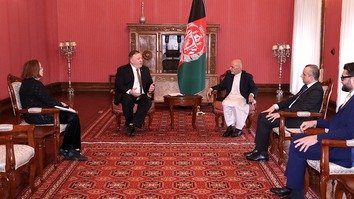KABUL -- The United States said late on Monday (July 13) that its landmark deal with the Taliban has entered the "next phase" while urging the militants to reduce rising violence to allow Afghan peace talks to begin.
The two sides signed an agreement in February that saw Washington pledge to withdraw all troops from Afghanistan by the middle of next year, in return for the insurgents promising to hold negotiations with the Afghan government to end the war.
Under phase one, the US said it would reduce troops to 8,600 within 135 days.
On the 135th day, US Special Representative on Afghanistan Reconciliation Zalmay Khalilzad tweeted that both sides had reached a "key milestone".
Keeping one's commitments
"The US has worked hard to carry out 1st phase of its commitments under the agreement, including to reduce troops & depart five bases," he said July 13.
As the deal entered its "next phase", Washington's approach will be based on certain conditions, Khalilzad warned.
"We will press for completion of prisoner releases, reduction of violence ... & start of & progress in intra-Afghan negotiations," he said.
Kabul pledged to free some 5,000 Taliban prisoners in a swap that would see the insurgents release about 1,000 captured Afghan security personnel.
The government has so far released more than 4,000 Taliban inmates, while the insurgents have freed more than 600 Afghan security personnel.
However, since the deal's signing, the Taliban have stepped up attacks across much of Afghanistan, killing hundreds of civilians.
Pointless Taliban violence
Khalilzad too condemned the violence, saying "large numbers" of Afghans continued to die without a reason.
"Violence has been high, especially in recent days and weeks," Khalilzad said, condemning a Taliban attack July 13 on a rural office of Afghanistan's intelligence agency that killed 11 security personnel.
"The Taliban's attack... contradicts their commitment to reduce violence until a permanent ceasefire is reached in intra-Afghan talks."
The Taliban in a statement Tuesday (July 14) welcomed the completion of phase one but complained of coalition support for Afghan security forces in operations against the group.
In the first six months of this year, a total of 1,213 civilians were killed and another 1,744 wounded in 880 incidents across the country, the Afghanistan Independent Human Rights Commission said in a report July 14.
The figures showed a drop of 11% as compared to the first half of 2019, it said.
Taliban militants were responsible for the majority of attacks, according to the report.

![US Special Representative for Afghanistan Reconciliation Zalmay Khalilzad arrives for the signing ceremony of the US-Taliban agreement in Doha, Qatar, February 29. [Karim Jaafar/AFP]](/cnmi_st/images/2020/07/14/24977-000_1pg2j4-585_329.jpg)







Your articles uses the term 'insurgents' for Taliban which is not fair and it shows you are biased.
Reply5 Comment
The root of all corruptions in Afghanistan is the government of the United States. The issue of the people of the United States is separate. They are our friends.
Reply5 Comment
Before signing peace deal with Taliban, America should have compelled Taliban to accept ceasefire; however, America did not do so and now Taliban kill innocent people everyday and all its responsibility goes to America.
Reply5 Comment
Khalilzad is responsible for all the miseries of Afghanistan. If Khalilzad gave right consultation to Washington at the Bonn Conference in 2001 and asked Taliban and Hikmatyar’s Islamic Party to share power in the Afghan government as well, hundreds of thousands of people would not have been killed in Afghanistan. Khalilzad had not studied the history of Afghanistan and he had not been familiar with the habit and temperament of Afghans, as they never accept military presence of the foreign countries. The history has shown that Afghans have always had sensitivity against colonization and fought against it. England was defeated in Afghanistan, while it was victorious in India and other Asian and African countries. Russia was able to rule over all Central Asian countries, but failed to rule Afghanistan. Therefore, the United States should have followed the UK and Russia as an example and did not attempt to bring its troops to Afghanistan. The United States could have worked as a mediator between Taliban and Mujaheddin and should have asked Taliban to sever their relations with terrorist groups, and in exchange of that, it should have given money to the Taliban government. The United States should now try to put pressure on Taliban and the Afghan government to make peace with each other and stop killing and bloodshed in the country.
Reply5 Comment
The United States of America has been the cause of killing of hundreds of thousands of people over the past two decades in Afghanistan. Why America invaded Afghanistan in 2001 and brought its forces to Afghanistan, while Osama was in Pakistan? Why did America destroy Taliban regime and replace it with its colonial government? Why is now America withdrawing irresponsibly from Afghanistan? Why does America support both the Kabul government and Taliban? Washington is a Satan. Why didn’t the United States ask Taliban in the agreement it signed with them to declare a ceasefire? What does reduction in violence mean? During the U.S. peace negotiations with Taliban, if America wanted to make Taliban to accept the ceasefire, it could do so, but the United States did not do that. The United States let the killing and bloodshed continue in the country after it leaves Afghanistan. Therefore, America did not end the war in Afghanistan and kept it alight, and now it is watching it. America is happy that Muslims are fighting among themselves and killing each other. May God destroy America together with Khalilzad.
Reply5 Comment